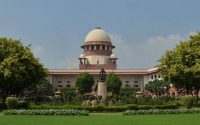Supreme Court judge says he is thinking of renouncing his smartphone
Source: thehindu.com
Supreme Court Judge Justice Deepak Gupta on Tuesday expressed his extreme unease at the dangerous inroads made by online technology, saying it hardly took five minutes to buy an AK-47 on the dark web.
A visibly alarmed Justice Gupta said he may renounce his smartphone and embrace privacy. He observed orally that innocents were trolled online, anonymous entities used social media to drag reputations through the mud, hate and crimes like paedophilia spread online unchecked. It was necessary to trace and punish the ‘originators’ of these crimes. The government had to take the initiative with social intermediaries such as Facebook and WhatsApp; courts have little expertise in the area.
“Why should someone be able to troll me and spread lies about my character online? State can look after itself but what about the individual? What remedy is there?” Justice Gupta expressed his anguish.
“Dangerous the way this technology is going. I am even thinking of giving up my smartphone and going back to what it was…” the judge said.
The Bench, also comprising Justice Aniruddha Bose, gave the Central government three weeks to file a detailed affidavit on the framing of guidelines/rules for sharing of information by social media platforms with law enforcement agencies without compromising individual privacy. The court directed the Ministry of Information Technology three weeks to file the affidavit.
The court dismissed the argument that online platforms were mostly clueless about the originators due to the end-to-end encryption technology they provide users.
“We just cannot get away by saying that we don’t have the technology. If there is a technology to do it, then there ought to be a technology to stop it,” Justice Gupta observed. “There has to be strict guidelines. “But my privacy should also be protected. My personal information cannot be entirely disclosed just because some police commissioner asked for it… Requesting you to frame the guidelines as soon as possible”.
Attorney General K.K. Venugopal said a professor from the Indian Institute of Technology in Chennai had claimed it was possible to crack the end-to-end encryption and trace the originators. Mr. Venugopal said the Internet has become a medium of pornography and terrorism.
“If they [social media platforms] claim they cannot find the originators, they have no right to function here,” Mr. Venugopal took an aggressive tone.
Senior advocate Kapil Sibal, for WhatsApp, shot back “then you [government] close it. Government of India is using WhatsApp. You stop using WhatsApp”.
Senior advocate Mukul Rohatgi, for Facebook, agreed with the Bench that the government and its Information Technology experts were better equipped than courts to create a framework for sharing information between police and social media platforms.
Justice Gupta noted, “Yes, we don’t decide policies. Policies are made by the government. After they make policies we see whether policies measure up to the rights in the Constitution.”
The Bench agreed that several issues in this regard needed to be “ironed out”. The Centre, while framing the rules, should ensure that neither individual privacy and reputation nor sovereignty of the State were harmed, it recorded in the order.
Solicitor General Tushar Mehta informed the court that discussions and debates on the draft rules are going on. However, it would not be possible to fix a time-frame for notifying the rules.
Mr. Mehta agreed it is necessary to “balance public interest with privacy”.
To Justice Gupta’s comment about giving up his smartphone, Mr. Mehta reacted that “some of us have already implemented it”.
The Supreme Court is hearing a petition filed by Facebook to call forth petitions pending in various high courts, including the Madras High Court, concerning the linking of social media accounts of online users with their Aadhaar numbers.
Facebook wants the apex court to transfer the pending petitions to itself and decide them finally. The company said any rule to enforce Aadhaar-social media accounts would be an invasion of privacy, declared a fundamental right by the Supreme Court.



